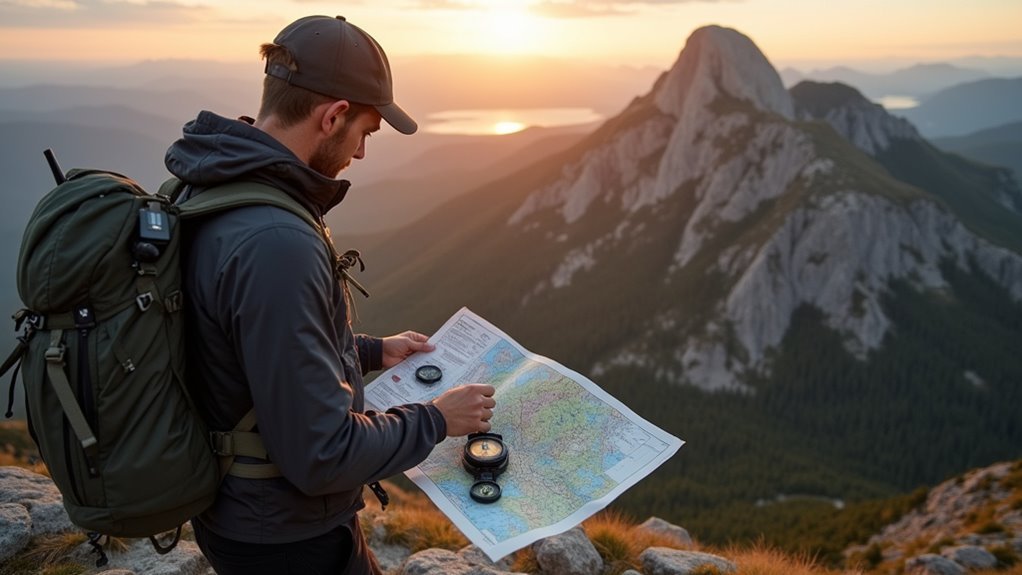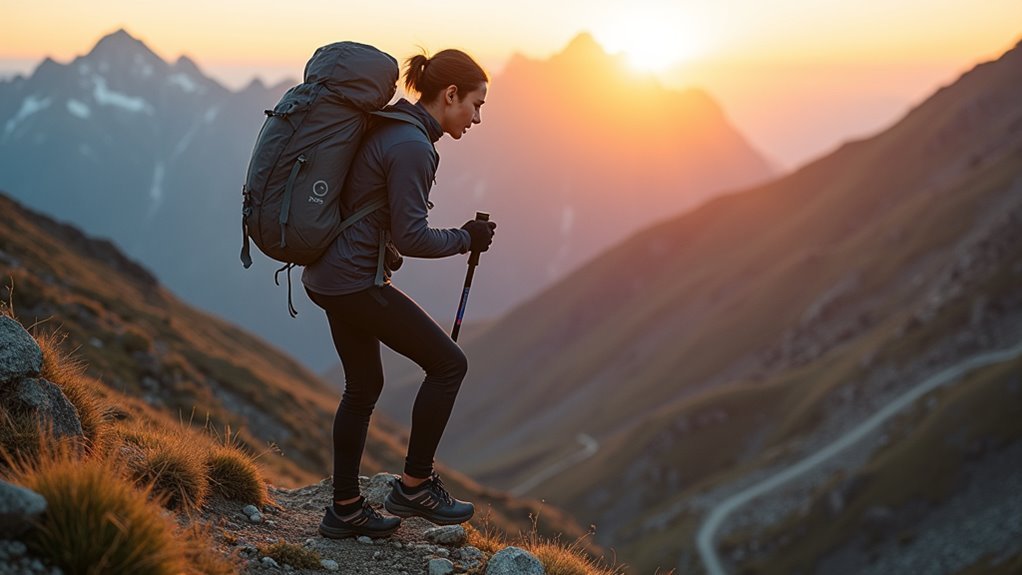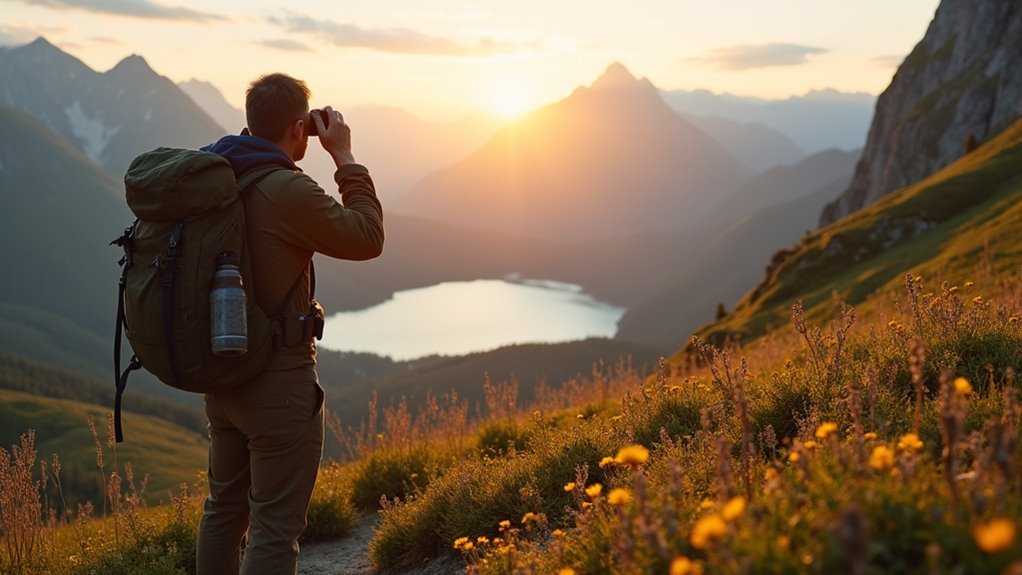Some of the links in this article may be affiliate links. If you make a purchase through these links, we may earn a small commission at no extra cost to you. Thank you.
Like Edmund Hillary conquering Everest, I’ve faced my share of extreme geocaching challenges that push normal navigation skills to their limits. I’ve learned—sometimes the hard way—that finding those hard-to-reach caches takes specialized preparation most casual cachers don’t consider. If you’re thinking about venturing beyond maintained trails to search for those five-star difficulty caches, you’ll need to understand what actually separates the weekend hobbyists from serious wilderness cachers.
Thank you for reading this post, don't forget to subscribe!
Advanced Navigation Techniques for Remote Areas

Why do experienced geocachers always seem to find those impossibly hidden caches while the rest of us wander in circles? I’ll let you in on a secret: it’s all about mastering navigation in challenging terrain.
When I’m tackling remote wilderness caches, I’ve learned that smartphone GPS just doesn’t cut it. Dedicated GPS devices offer accuracy within 3 meters even in dense forest—that’s a game-changer! I think the investment is absolutely worth it for serious adventures.
Dedicated GPS devices: the not-so-secret weapon separating wilderness geocaching masters from frustrated newbies.
Don’t forget to prepare your Geocaching app before heading out. I always download offline coordinates for my target caches—nothing worse than losing signal halfway up a mountain!
For those tricky 4.0+ terrain caches, I combine my GPS with altimeter readings to track elevation changes, which, you know, might exceed 1,000 feet in some areas.
Essential Gear for High-Altitude and Wilderness Caches
When I’m tackling those extreme high-altitude caches, I’ve found that a dedicated GPS device is worth its weight in gold – smartphones just can’t match their accuracy or battery life when you’re miles from civilization.
You’ll also need weather-resistant gear that can handle whatever Mother Nature throws at you, like waterproof flashlights and thermal layers that won’t quit when temperatures plummet.
I always tell fellow cachers that proper alpine navigation tools aren’t just nice-to-haves but absolute necessities, because, trust me, there’s nothing worse than being caught unprepared when the weather turns or daylight fades on a remote mountainside.
Alpine Navigation Tools
Traversing the rugged wilderness for those elusive high-altitude caches isn’t something you can wing with just your smartphone and a prayer.
I’ve learned the hard way that dedicated GPS units offer accuracy and battery life that’ll save your bacon when you’re miles from civilization.
The Geocaching® app’s premium offline features are absolutely worth it for downloading coordinates before heading into no-service zones.
Here’s what I always pack:
- Handheld GPS unit with integrated altimeter
- Topographic maps and compass as non-electronic backups
- Advanced geocaching apps like c:geo or GSAK for complex multi-stage caches
Trust me, when you’re searching for a terrain 5.0 cache at 10,000 feet, you’ll appreciate having tools that understand elevation changes and can guide you accurately even when cell towers are just distant memories.
Weather-Resistant Equipment Essentials
Anyone who’s spent hours hunting for a cache in sudden mountain sleet knows this truth: your equipment’s weather resistance isn’t optional—it’s survival gear.
I’ve learned the hard way that Global Positioning systems for high-altitude geocaching must handle extreme conditions.
Those handheld units with extended battery life? Absolute lifesavers when you’re miles from civilization.
For climbing gear, I always, always check my ropes for weather resistance before tackling caches at elevation—moisture-damaged equipment is, well, terrifying.
Don’t forget waterproof flashlights!
I once made that mistake during a rainy evening search and, um, let’s just say I won’t repeat it.
My GoPro Hero 8 has been fantastic for documenting finds in wet conditions.
When geocaching in extreme terrain, remember: proper weather-resistant equipment isn’t just about finding the cache—it’s about getting home safely.
Physical Preparation and Endurance Training

How well prepared is your body for the challenges of extreme geocaching?
I’ve seen countless treasure hunters face a high difficulty rating only to log “Can’t Find” when their bodies gave out before their searching skills did.
In my experience, endurance training makes all the difference between success and frustration.
Endurance training transforms impossible caches into conquerable challenges for the prepared geocacher.
- Elevation training: Tackle hikes with at least 1,000 feet of gain weekly – your legs will thank you when you’re scaling that abandoned mill cache.
- Strength foundation: Incorporate pull-ups and squats to handle rocky terrain – I once struggled with GC1MHD0 because, well, my upper body wasn’t ready for that climb!
- Core stability: Do planks and balance work daily – they’ve saved me from injuries on those tricky wilderness paths.
Weather Considerations and Seasonal Challenges
When the skies darken unexpectedly on a geocaching expedition, you’ll quickly learn why weather awareness isn’t just recommended—it’s essential for survival.
I’ve seen too many adventurers rush to find specific locations marked by coordinates without checking the forecast first.
In mountainous areas, temperatures can plummet without warning.
I always pack extra layers—learned that lesson at GC1MHD0 when snow blocked my path!
During rainy seasons, those new places you’re excited to explore might involve slippery trails or suddenly dangerous water crossings.
Summer brings its own challenges.
Trust me, you don’t want to be caught on an exposed mountain without enough water.
And don’t forget, uh, seasonal pests like ticks thrive in warm, humid weather—making your adventure memorable for all the wrong reasons.
Wildlife Awareness and Environmental Safety

The wilderness doesn’t care about your geocaching agenda—it operates by its own ancient rules.
As a hide and seek enthusiast, I’ve learned that wildlife awareness isn’t optional—it’s survival.
Black bears in the Rockies account for 90% of human conflicts, usually because someone didn’t secure their food properly.
I mean, would you want a hungry bear discovering your cache instead of the online community you intended?
When venturing into extreme terrain, remember these essentials:
- Always use bear-resistant containers for gear—the cache owner’s responsibility extends beyond the game
- Wear long pants and repellent in tick-prone areas (Lyme disease affects 476,000 Americans annually!)
- Plan your adventure around wildlife patterns—elk migrate to higher elevations in summer, so adjust accordingly
Emergency Preparedness and Risk Mitigation
Why do so many geocachers underestimate the true risk of extreme terrain hunts?
I think it’s because we get caught up in the thrill of the find and forget that nature doesn’t care about our hobby.
Nature doesn’t keep score of our cache finds—it only measures our respect for its power.
I’ve learned the hard way that a Buddy System isn’t optional—it’s essential.
When I slipped at that abandoned mill cache, having my friend there probably saved me from a serious situation.
Always pack proper Emergency Gear.
A first-aid kit, whistle, and multi-tool might seem like overkill until you’re facing unexpected weather or wildlife.
The best Risk Mitigation strategy?
Tell someone exactly where you’re going and when you’ll be back.
Those high difficulty caches with 4.0+ ratings aren’t just challenging—they can be dangerous if you’re unprepared.
Frequently Asked Questions
Is Geocaching Still a Thing in 2025?
Time flies, but Geocaching relevance in 2025 remains strong, with millions of caches worldwide and active community forums discussing 2025 trends, ensuring its future popularity.
What Skills Are Needed for Geocaching?
I’d say you’ll need GPS skills to locate hidden treasures, hiking techniques for traversing varied terrain, and problem-solving abilities to decipher clues and overcome physical challenges along your geocaching journey.
Is There Ever Money in Geocaches?
Like a library forbidding food to protect its books, geocaching prohibits currency finds. I’ve never found money in legitimate caches—it’s against the ethics of our hidden treasures community.
What Are the Three Main Rules of Geocaching?
As I’ve learned, the three main rules of geocaching are: sign the logbook, trade fairly if taking items, and leave no trace. These community standards prevent rule violations and uphold our ethical guidelines.